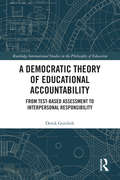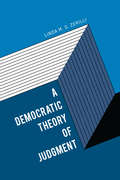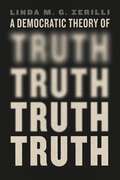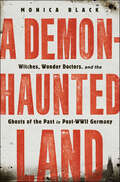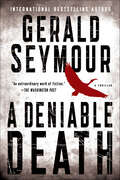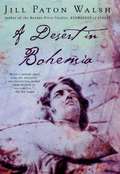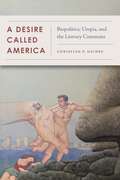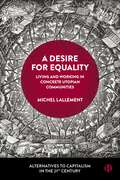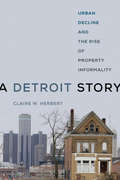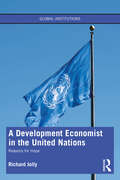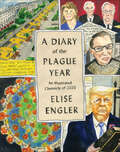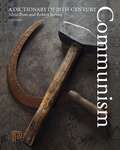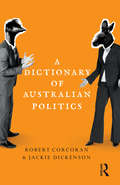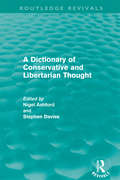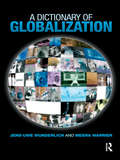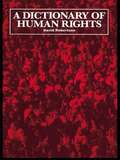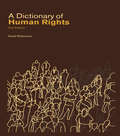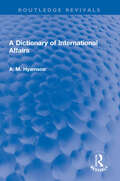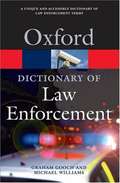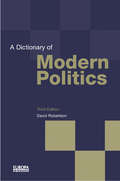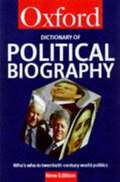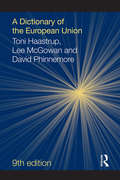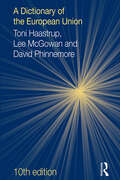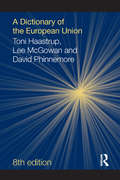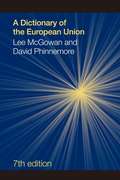- Table View
- List View
A Democratic Theory of Educational Accountability: From Test-Based Assessment to Interpersonal Responsibility (Routledge International Studies in the Philosophy of Education)
by Derek GottliebThis insightful text offers a detailed account of the historical development of educational accountability in the US public education system. In doing so, it diagnoses the unforeseen consequences arising from a centralized, technocratic implementation of the concept, and calls for a radical re-thinking in how our democratic responsibilities translate into the provision, measurement, and conceptualization of education. Drawing from the works of scholars including Stanley Cavell, Linda Zerilli, Daniel Koretz, and James Scott, A Democratic Theory of Educational Accountability illustrates the way in which "educational accountability" has foregrounded centralized measures of "success" to the point of perversity. Through nuanced political theory and philosophical arguments, the text demonstrates how test-based measures have rendered the holistic aims of education futile, resulting in an education system of "box-checking" and "rule-following". Ultimately calling for a new imagination of how our democratic responsibilities are enacted in schools and communities, Gottlieb illustrates how accountability can be used for good, to ensure that our schools nurture talent, cultivate social mobility, and engage with local needs. This text will be of great interest to graduate and postgraduate students, researchers, academics, and libraries in the field of philosophy of education, educational policy, assessment & testing and democratic theory.
A Democratic Theory of Judgment
by Linda M.G. ZerilliIn this sweeping look at political and philosophical history, Linda M. G. Zerilli unpacks the tightly woven core of Hannah Arendt’s unfinished work on a tenacious modern problem: how to judge critically in the wake of the collapse of inherited criteria of judgment. Engaging a remarkable breadth of thinkers, including Ludwig Wittgenstein, Leo Strauss, Immanuel Kant, Frederick Douglass, John Rawls, Jürgen Habermas, Martha Nussbaum, and many others, Zerilli clears a hopeful path between an untenable universalism and a cultural relativism that forever defers the possibility of judging at all. Zerilli deftly outlines the limitations of existing debates, both those that concern themselves with the impossibility of judging across cultures and those that try to find transcendental, rational values to anchor judgment. Looking at Kant through the lens of Arendt, Zerilli develops the notion of a public conception of truth, and from there she explores relativism, historicism, and universalism as they shape feminist approaches to judgment. Following Arendt even further, Zerilli arrives at a hopeful new pathway—seeing the collapse of philosophical criteria for judgment not as a problem but a way to practice judgment anew as a world-building activity of democratic citizens. The result is an astonishing theoretical argument that travels through—and goes beyond—some of the most important political thought of the modern period.
A Democratic Theory of Truth
by Linda M. ZerilliA critique of the concept of truth presupposed by the post-truth debate—and a bold new vision for a more pluralistic citizenry. We say that we live in a “post-truth” era because disinformation threatens our confidence in the existence of a shared public world. Affirming objective truth may, therefore, seem necessary to save democracy. According to political theorist Linda M. G. Zerilli, such affirmation can stifle political debate and silence dissent. In fact, Zerilli argues that the unqualified insistence on objective truth is as dangerous for democracy as denying it. Drawing on Arendt, Foucault, and Wittgenstein, A Democratic Theory of Truth challenges the concept of truth presupposed by the post-truth debate. It argues that we, the people, have an essential role in discovering and evaluating any truth relevant to the political realm. The result is a striking defense of plurality, dissent, and opinion in contemporary democratic societies.
A Demon-Haunted Land: Witches, Wonder Doctors, and the Ghosts of the Past in Post-WWII Germany
by Monica Black“A Demon-Haunted Land is absorbing, gripping, and utterly fascinating... Beautifully written, without even a hint of jargon or pretension, it casts a significant and unexpected new light on the early phase of the Federal Republic of Germany’s history. Black’s analysis of the copious, largely unknown archival sources on which the book is based is unfailingly subtle and intelligent.”—Richard J. Evans, The New RepublicIn the aftermath of World War II, a succession of mass supernatural events swept through war-torn Germany. A messianic faith healer rose to extraordinary fame, prayer groups performed exorcisms, and enormous crowds traveled to witness apparitions of the Virgin Mary. Most strikingly, scores of people accused their neighbors of witchcraft, and found themselves in turn hauled into court on charges of defamation, assault, and even murder. What linked these events, in the wake of an annihilationist war and the Holocaust, was a widespread preoccupation with evil. While many histories emphasize Germany’s rapid transition from genocidal dictatorship to liberal democracy, A Demon-Haunted Land places in full view the toxic mistrust, profound bitterness, and spiritual malaise that unfolded alongside the economic miracle. Drawing on previously unpublished archival materials, acclaimed historian Monica Black argues that the surge of supernatural obsessions stemmed from the unspoken guilt and shame of a nation remarkably silent about what was euphemistically called “the most recent past.” This shadow history irrevocably changes our view of postwar Germany, revealing the country’s fraught emotional life, deep moral disquiet, and the cost of trying to bury a horrific legacy.
A Deniable Death: A Thriller
by Gerald SeymourA page-turning thriller of life and death in the moral maze of the post-9/11 world—“An extraordinary work of fiction” from the bestselling author (The Washington Post).The rules are simple. Break up your shape. Hide your smell. Never show your silhouette. Check the surfaces of your kit. Space the movements of your team. Use the shadows. Danny “Badger” Baxter has a talent for surveillance. He’s always followed the rules. Until now, they’ve kept him alive.But now Badger has a bigger job than photographing dissident Northern Irish Republicans in muddy Ulster fields, or Islamic extremists on rainswept Yorkshire moors. MI6 have a plan to assassinate the Engineer—a brilliant maker of Improvised Explosive Devices, the roadside bombs which account for 80% of Allied casualties in Iraq and Afghanistan. The spooks know he’s planning to leave his home in Iran. They just need to find out when and where he’s traveling.So Badger finds himself on the wrong side of the Iranian border, burdened with a partner he loathes, lying under a merciless sun in a mosquito-infested marsh, observing the house. If things go wrong, as far as Her Majesty’s Government is concerned, his part in the plot is completely deniable.With A Deniable Death, Gerald Seymour expertly explores the moral compromises of the secret world upon which we rely for our everyday security—and the amazing reserves of courage which ordinary people can find in extraordinary circumstances.A Washington Post Notable Fiction Book of 2013“The three British masters of suspense, Graham Greene, Eric Ambler, and John le Carré, have been joined by a fourth—Gerald Seymour.” —The New York Times
A Desert in Bohemia
by Jill Paton WalshTold through the eyes of nine characters who live through the 40 years between the end of the war and the fall of Communism, this book is a complex and enthralling testament to the power and powerlessness of the individual in challenging times.
A Desire Called America: Biopolitics, Utopia, and the Literary Commons
by Christian HainesCritics of American exceptionalism usually view it as a destructive force eroding the radical energies of social movements and aesthetic practices. In A Desire Called America, Christian P. Haines confronts a troubling paradox: Some of the most provocative political projects in the United States are remarkably invested in American exceptionalism. Riding a strange current of U.S. literature that draws on American exceptionalism only to overturn it in the name of utopian desire, Haines reveals a tradition of viewing the United States as a unique and exemplary political model while rejecting exceptionalism’s commitments to nationalism, capitalism, and individualism. Through Walt Whitman, Emily Dickinson, William S. Burroughs, and Thomas Pynchon, Haines brings to light a radically different version of the American dream—one in which political subjects value an organization of social life that includes democratic self-governance, egalitarian cooperation, and communal property.A Desire Called America brings utopian studies and the critical discourse of biopolitics to bear upon each other, suggesting that utopia might be less another place than our best hope for confronting authoritarianism, neoliberalism, and a resurgent exclusionary nationalism.
A Desire for Equality: Living and Working in Concrete Utopian Communities (Alternatives to Capitalism in the 21st Century)
by Michel LallementSince the late 1960s, individuals rebelling against societal norms have embraced intentional communities as a means to challenge capitalism and manifest their ideals. Combining archival work with an ethnographic approach, this book examines how these communities have implemented the utopias they claim to have in their daily lives.Focusing primarily on intentional communities in the United States who have adopted egalitarian principles of life and work, notably Twin Oaks in Virginia, the author examines the lives and actions of members to further understand these concrete utopias. In doing so, the book demonstrates that intentional communities aren't relics of a bygone era but rather catalysts capable of shaping our future.
A Detroit Story: Urban Decline and the Rise of Property Informality
by Claire W. HerbertBringing to the fore a wealth of original research, A Detroit Story examines how the informal reclamation of abandoned property has been shaping Detroit for decades. Claire Herbert lived in the city for almost five years to get a ground-view sense of how this process molds urban areas. She participated in community meetings and tax foreclosure protests, interviewed various groups, followed scrappers through abandoned buildings, and visited squatted houses and gardens. Herbert found that new residents with more privilege often have their back-to-the-earth practices formalized by local policies, whereas longtime, more disempowered residents, usually representing communities of color, have their practices labeled as illegal and illegitimate. She teases out how these divergent treatments reproduce long-standing inequalities in race, class, and property ownership.
A Development Economist in the United Nations: Reasons for Hope (Global Institutions)
by Richard JollyThis book explores the joys and occasional frustrations of a development economist working for the United Nations. From 1982 to 2000 Richard Jolly worked in senior positions in UNICEF and UNDP on assignments that were innovative, for the UN, the countries concerned and for development. The book analyses his experiences as Deputy Director of UNICEF, Principal Coordinator and co-author of UNDP’s widely acclaimed Human Development Report and a community development officer in Kenya, as well as his involvement in the UN and country mission to Zambia and ILO employment missions to Colombia, Sri Lanka and Kenya. It shows what the UN can achieve when there is strong leadership at central and field levels, together with decentralized approaches. Jolly’s experiences lead him to conclude there are in fact three UNs: the formal UN of governments; the second UN comprising UN staff members, often the source of initiatives and action; and the third UN of NGOs, experts, consultants and others closely following the UN or working with it, and also often bringing new thinking and innovation. Reflecting on the need for international action to be more effective and the UN to be more strongly supported, this volume is a fascinating guide to students and scholars of global governance, development and international organizations and those working for them.
A Diary of the Plague Year: An Illustrated Chronicle of 2020
by Elise EnglerAn extraordinary illustrated chronicle of 2020 that captures this indelible year in America in all its tragic, surreal, epic, and (sometimes) comedic intensityArtist Elise Engler set herself a task five years ago: to illustrate the first headline she heard on her bedside radio every morning. The idea was to create a pictorial record of one year of listening to the news. But when Donald Trump was elected, the headlines turned too wild for her to stop the experiment.Then 2020 happened. Was there ever such a year? Headlines about the death of Kobe Bryant and Donald Trump's impeachment began to give way to news of a mysterious virus in China, and Engler’s pages were quickly filled with the march of COVID-19: schools closing their doors, hospitals overflowing, graveyards full to capacity. Day by day, Engler drew every shocking turn of the year: the police murder of George Floyd and protests around the globe; a war against science and those who preached it; fires consuming California; a vicious election, absurdly contested. Other stories appeared, too: “Harvey Weinstein Sentenced,” “Ruth Bader Ginsburg Hospitalized,” “China Extends Control over Hong Kong,” and—on repeat—“Stock Market Plunges.”The result is a powerful visual record of an unprecedented time, collected in A Diary of the Plague Year, which follows the headlines from the first appearance of the coronavirus to the inauguration of President Joe Biden. Made in real time, Engler’s vibrant, immediate images recapture what it was like to live through 2020, bringing texture, feeling, and even charm to what we might not remember and what we will never forget.
A Dictionary of 20th-Century Communism
by Robert Service Silvio PonsAn encyclopedic guide to 20th-century communism around the worldThe first book of its kind to appear since the end of the Cold War, this indispensable reference provides encyclopedic coverage of communism and its impact throughout the world in the 20th century. With the opening of archives in former communist states, scholars have found new material that has expanded and sometimes altered the understanding of communism as an ideological and political force. A Dictionary of 20th-Century Communism brings this scholarship to students, teachers, and scholars in related fields. In more than 400 concise entries, the book explains what communism was, the forms it took, and the enormous role it played in world history from the Russian Revolution through the collapse of the Soviet Union and beyond.Examines the political, intellectual, and social influences of communism around the globeFeatures contributions from an international team of 160 scholarsIncludes more than 400 entries on major topics, such as:Figures: Lenin, Mao, Stalin, Ho Chi Minh, Pol Pot, Castro, GorbachevEvents: Cold War, Prague Spring, Cultural Revolution, Sandinista RevolutionIdeas and concepts: Marxism-Leninism, cult of personality, laborOrganizations and movements: KGB, Comintern, Gulag, Khmer RougeRelated topics: totalitarianism, nationalism, antifascism, anticommunism, McCarthyismGuides readers to further research through bibliographies, cross-references, and an index
A Dictionary of Australian Politics
by Jackie Dickenson Robert Corcoran'The sheer complexity of modern government means that many citizens are uneasy about concepts that political insiders and journalists take for granted. A Dictionary of Australian Politics is a valuable guide to clearing a path through the jungle.' - Barry JonesFrom barbecue-stopper' to 'washminster', from 'chardonnay socialist' to 'xenophobia', A Dictionary of Australian Politics is a comprehensive and lively guide to Australian political language. With handy 'quick grab' definitions, it is supported by in-depth explanations of the history and usage of important terms. For anyone interested in politics, this is an authoritative and entertaining reference. It is uniquely Australian, bringing together a range of political terms and expressions that over time have entered the vernacular. It also includes international terms which are essential to political discussion.
A Dictionary of Conservative and Libertarian Thought (Routledge Revivals)
by Stephen Davies Nigel AshfordFirst published in 1991, this is a reissue of the path-breaking Dictionary of Conservative and Libertarian Thought, the first book to examine the ideals and arguments produced by the intellectual traditions of both conservatism and classical liberalism. Covering the ideas of many such distinguished thinkers as Hayek, Scruton, Friedman and Buchanan, the volume provides a valuable survey of the historical development of both schools of thought in all of the major western countries and their contributions to contemporary debates. From American Conservatism to French Liberalism, Invisible Hand to Organic Society, from Scientism to Scepticism and Utopianism to Voluntarism, this is a vital work whose reissue will be welcomed as much by the keen layperson as by students of political science, the history of philosophy, economics and public policy.
A Dictionary of Globalization
by Jens-Uwe Wunderlich Meera WarrierGlobalization has become one of the most important topics within politics and economics. This new title explains some of the related terminology, summarizes the surrounding theories and examines the international organizations involved. With the proliferation of communications and the rise of the multi-national corporation, the concept of globalization is vitally important to the modern political environment. The structure of the modern economy, based on information production and diffusion, has made national boundaries largely irrelevant. A Dictionary of Globalization explains theories, philosophies and ideologies, and includes short biographies of leading activists, theorists and thinkers such as Noam Chomsky, Karl Marx and José Bové. Concepts, issues and terms key to the understanding of globalization also have clear and concise definitions, including democracy, civil society, non-governmental organizations and ethnicity. Cross-referenced for ease of use, this title aims to be of great benefit to anyone studying politics or sociology. It will prove essential to public and academic libraries, as well as to businesses, government departments, embassies and journalists.
A Dictionary of Human Rights
by David RobertsonFirst Published in 1998. Routledge is an imprint of Taylor & Francis, an informa company.
A Dictionary of Human Rights
by David RobertsonThis reference work reflects the growing international concern over human rights. It provides explanations of the terminology, issues, organizations and laws surrounding this emotive subject. A Dictionary of Human Rights features:* over 200 clear and concise mini-essays* alphabetical arrangement for ease of useThis book is a vital source for anyone interested in or connected with human rights issues.
A Dictionary of International Affairs (Routledge Revivals)
by Albert M. HyamsonFirst published in 1946, A Dictionary of International Affairs is virtually an encyclopaedia. This highly useful reference work is indispensable to all who desire to be well-informed about the world in which they live. The scope of this book is unusually wide. It deals with such varied subjects of the Chaco Dispute, Ogpu, Syndicalism, Freedom of the Seas, Balfour Declaration, etc. It also contains statistics about minerals, agricultural produce, and industrial products. In addition, it provides essential information about erstwhile colonies, islands, and nations. It brings together – in a precise style and compact form – a vast amount of basic and interesting information on almost every conceivable aspect of international affairs. Chief emphasis is given to developments since World War I – particularly to those agreements, concepts, agencies, problems, areas and resources which are of continuing importance.
A Dictionary of Law Enforcement
by Michael Williams Graham GoochA Dictionary of Law Enforcement is the only dictionary available with a primary focus on UK law enforcement terms. Succinct and practical in its approach, it contains over 3,400 entries covering ever aspect of this diverse field, including terms related to law, pathology, forensic medicine, accountancy, insurance, shipping, commerce and trade, criminology, and psychology. Entries are supported by a wealth of practical information, including (where appropriate), citations and references to statutes and legislation. In addition to the definitions, the dictionary also contains five useful appendices: Abbreviations and Acronyms, Recordable Offences, Disclosure Code, Disclosure Guidelines and Disclosure Protocol. Written by two former police officers, both now lecturers in law and criminal investigation, the dictionary fills a significant gap in the law market and will be invaluable to police officers and trainee officers, students and lecturers of criminology, criminal justice, and police studies, and other professionals needing clear definitions of law enforcement terms.
A Dictionary of Modern Politics
by David Professor RobertsonA comprehensive guide to the complex ideology/terminology which surrounds the world of politics.* Well over 500 extensive definitions* Defines political theories, dogmas and phraseologies* Terms such as Pacifism, Proportional Representation, Jihad, Son of Star Wars, Third Way and Consensual are explained clearly and succinctly* Invaluable for anyone concerned with politics or current affairs.
A Dictionary of Political Biography
by Dennis KavanaghFrom Churchill, Stalin, and Kennedy, to Blair, Clinton and Mandela, A Dictionary of Political Biography covers all the major figures in world politics of the twentieth century. Compiled by an expert team of contributors under the editorship of Dennis Kavanagh, this new dictionary contains over 1,000 entries which describe and assess the lives of the men and women who have shaped political events across the world. Each entry includes an account of the background, career, and achievements of the individual concerned, balancing fact with critical appraisal.Including entries on Idi Amin, Yasser Arafat, Dwight D. Eisenhower, Slobadan Milosevic, Francois Mitterrand, Mary Robinson, and Mao Zedong, A Dictionary of Political Biography is an indispensable and authoritative reference for anyone interested in twentieth-century history and politics.
A Dictionary of the European Union
by Toni Haastrup David Phinnemore Lee McGowanThis unique collection of data includes concise definitions and explanations relating to all aspects of the European Union. It explains the terminology surrounding the EU, and outlines the roles and significance of its institutions, member countries, foreign relations, programmes and policies, treaties and personalities. It contains over 1,000 clear and succinct definitions and explains acronyms and abbreviations, which are arranged alphabetically and fully cross-referenced. Among the 1,000 entries you can find explanations of and background details on: ACP states Article 50 Brexit competition policy Donald Tusk the European Maritime and Fisheries Fund the euro Greece Jean-Claude Juncker Europol migration and asylum policy the Schengen Agreement the Single Supervisory Mechanism the single rulebook the Treaty of Lisbon Ukraine
A Dictionary of the European Union
by Toni Haastrup David Phinnemore Lee McGowanThis unique collection of data includes concise definitions and explanations relating to all aspects of the European Union. It explains the terminology surrounding the EU, and outlines the roles and significance of its institutions, member countries, foreign relations, programmes and policies, treaties and personalities. It contains over 1,000 clear and succinct definitions and explains acronyms and abbreviations, which are arranged alphabetically and fully cross-referenced. Among the 1,000 entries you can find explanations of and background details on: ACP states Article 50 Brexit competition policy Donald Tusk the European Maritime and Fisheries Fund the euro Greece Jean-Claude Juncker Europol migration and asylum policy the Schengen Agreement the Single Supervisory Mechanism the single rulebook the Treaty of Lisbon Ukraine
A Dictionary of the European Union
by Toni Haastrup David Phinnemore Lee McGowanThis unique collection of data includes concise definitions and explanations relating to all aspects of the European Union. It explains the terminology surrounding the EU, and outlines the roles and significance of its institutions, member countries, foreign relations, programmes and policies, treaties and personalities. It contains over 1,000 clear and succinct definitions and explains acronyms and abbreviations, which are arranged alphabetically and fully cross-referenced. Among the 1,000 entries you can find explanations of and background details on: ACP states Article 50 Brexit competition policy Donald Tusk the European Maritime and Fisheries Fund the euro Greece Jean-Claude Juncker Europol migration and asylum policy the Schengen Agreement the Single Supervisory Mechanism the single rulebook the Treaty of Lisbon Ukraine
A Dictionary of the European Union
by David Phinnemore Lee McGowanThis unique collection of data includes concise definitions and explanations relating to all aspects of the European Union. It explains the terminology surrounding the EU and outlines the roles and significance of the institutions, member countries, foreign relations, programmes and policies, treaties and personalities. It contains over 1,000 clear and succinct definitions and explains acronyms and abbreviations, which are arranged alphabetically and fully cross-referenced. The book has been fully updated to include details of the elections to the European Parliament and the appointment of the new European Commission in 2014, together with other important revisions. Among the 1,000 entries you can find explanations and background details on:accession negotiations the African Union the ‘Arab Spring’ the Common Agricultural Policy competition policy the European Maritime and Fisheries Fund the euro human rights Jean-Claude Juncker the European Anti-Fraud Office (OLAF) the Schengen Agreement Serbia the Single Supervisory Mechanism the single rulebook the Treaty of Lisbon Ukraine
